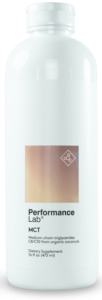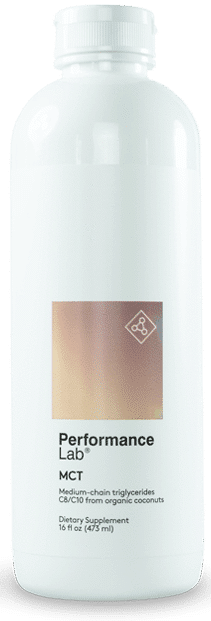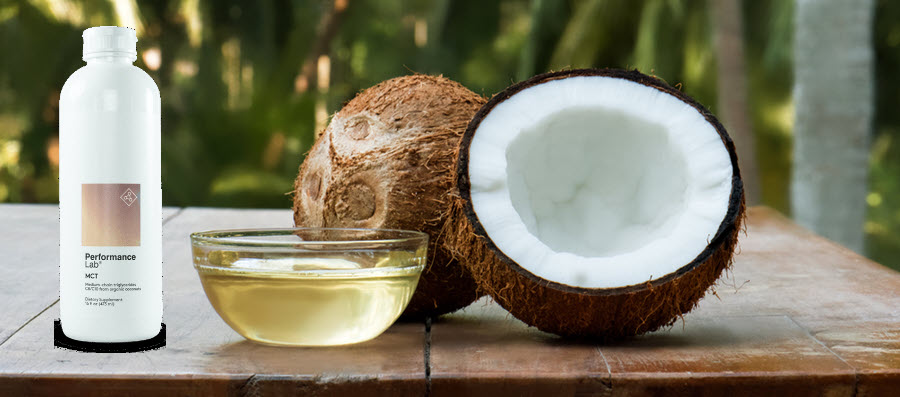Table of Contents
Do a search for “Best MCT Oil for 2026″ and it’s all over the place. Every major and even unheard-of supplement manufacturer is selling an MCT Oil supplement.
So I frequently get asked by people in the Nootropics Expert® community which MCT Oil supplement really is the best.
In this review you’ll discover that it is possible to produce a 100% USDA Organic Certified MCT Oil. And that both MCT C-8 and C-10 provide ketogenic diet value as a nootropic supplement.
After analyzing the market, the evidence is clear, bulletproof in fact, that the best liquid MCT Oil available in 2026 is Performance Lab® MCT Energy Oil.
Use this page as your guide on how to tell the difference when looking at a row of MCT Oil supplements side-by-side on a store shelf.
And find out why I recommend the new Performance Lab® MCT Energy Oil for 2026 above all the other MCT Oil products available today.
What is MCT Oil?
“MCT” stands for medium-chain triglycerides. MCTs are fatty acids that are naturally sourced from coconut oil.
MCTs easily cross your blood-brain barrier and delivered across cell membranes to mitochondria. Where they’re converted to ketones and used instead of glucose to make adenosine triphosphate (ATP).
MCT Oil is ideal as a quick natural source of energy and perfect addition for nearly any nootropic stack.
A tablespoon of good MCT Oil helps your body and brain absorb the fat-soluble nootropics in your stack.
MCT Oil quickly converts into ketones to support a keto diet and weight management. It helps suppress hunger cravings, supports better and longer workouts, supports mitochondria and your microbiome, and helps prevent neurodegenerative disease.
Next, I’ll compare the benefits of choosing a quality MCT Oil over unrefined coconut oil. And why you may want to choose MCT Oil instead.
Use the Table of Contents above to skip through to the sections of this review that interest you.
But if you can’t wait and want to get the best MCT Oil for 2026, go to:
Coconut Oil vs. MCT Oil: What’s the Difference?
Unrefined Coconut Oil is composed primarily of saturated fatty acids.
 Saturated fats consist of fatty acids whose carbon chain is “saturated” with hydrogen. Fatty acids are chain-like molecules of carbon, hydrogen and oxygen linked in groups of three to a backbone of glycerol.
Saturated fats consist of fatty acids whose carbon chain is “saturated” with hydrogen. Fatty acids are chain-like molecules of carbon, hydrogen and oxygen linked in groups of three to a backbone of glycerol.
When coconut oil is consumed, the fatty acids separate from their glycerol backbone during the digestion process.
When you eat saturated fat, its digested and makes its way through your intestinal wall. Most of this digestion occurs in the upper part of your intestine using digestive lipases (digestive enzymes) which act on fat (triglycerides) that has been emulsified with the aid of bile acids.
The duration of fat digestion and absorption
depend on the length of the fatty acid chain.
Fatty acid chains are classified as long chain fatty acids (LCFAs), medium chain fatty acids (MCFAs or MCTs) and short chain fatty acids (SCFAs).
Each of these fatty acid subgroups are broken down further; short- (C2 – C6), medium- (C8 – C12) and long- (C14 – C24) chain fatty acids.
LCFAs are transported by carriers in the lymph system and end up in your liver or other tissues. Once LCFAs enter cells, they combine with coenzyme A to form acetyl-CoA chains.
These acetyl-CoA chains are transferred into mitochondria within cells, where they are broken down into acetyl-CoA units. This process is called β-oxidation.
Here is the key difference; medium chain fatty acids from coconut oil skip the lymph system and go straight to your liver. Then cross the blood-brain barrier and are oxidized in brain cells through β-oxidation for acetyl-CoA generation and subsequent production of ketone bodies.
These ketones can then be used as metabolic fuel by mitochondria for ATP synthesis.[i]
Here’s the thing … because they bypass the lymph system, your body does not store these medium-chain fatty acids in adipose (fat) tissue to use later when energy is low.
This direct transport to your liver and then to your brain for ketone production is how MCTs can supply energy more rapidly than unrefined coconut oil. Hence, giving you better brain health, energy levels, and assist with weight loss.
Types of MCT Oil
You can get medium chain fatty acids (MCFAs) from coconut oil (Cocos nucifera), palm oil (Elaesis guineensis), goat milk, and breast milk.
Coconut Oil is unique because it is made up of about 90% saturated fats. And nearly 60% of the fats in coconut oil are medium chain fatty acids (MCFAs) which are also called medium chain triglycerides (MCT).
These MCTs are identified by their carbon chain and ranging from 6 to 12 carbon atoms in length; caproic acid C-6 (0.5%), caprylic acid C-8 (7.8%), capric acid, C-10 (6.7%), and lauric acid C-12 (47.5%).[ii]
caproic acid C-6 (0.5%) – found in coconut oil in very small amounts and tastes bad so is not used in high quality MCT Oil. If you get MCT Oil that tastes a little strange and burns your throat it’s likely that it contains C-6 which was not removed during filtration.
 caprylic acid C-8 (7.8%) – one of two MCTs used in high quality MCT Oil because it quickly converts to ketones in your brain. MCTs that cross your blood-brain barrier to be used in brain cell mitochondria for ATP energy production.
caprylic acid C-8 (7.8%) – one of two MCTs used in high quality MCT Oil because it quickly converts to ketones in your brain. MCTs that cross your blood-brain barrier to be used in brain cell mitochondria for ATP energy production.
capric acid C-10 (6.7%) – the other MCT used in high quality MCT Oil because it quickly converts to ketones which are used in brain cell mitochondria for ATP energy production.
lauric acid C-12 (47.5%) – not used in high quality MCT Oil because it acts more like a long-chain triglyceride than an MCT. It uses your lymph system to make its way to your liver before being available for ketone production.
Cheaper quality MCT Oil often contains C-12 because it’s cheaper to make than MCT Oil that uses only C-8 and C-10. Also harder on your digestive system.
MCT Oil Quality Matters
MCT Oil is also called “Fractionated Coconut Oil” and usually found in the “oils” section of your local supermarket. MCT Oil is used as a nootropic supplement and Fractionated Coconut Oil is used as cooking oil. Both can contain caprylic acid C-8 and capric acid C-10.
The difference is quality. Fractionated Coconut Oil is often made from GMO coconuts or palm oil, hydrogenated and chemically processed with hexanes. And many do not filter out C-6 or C-12 which can taste awful and result in stomach upset.
The best organic MCT oil like Performance Lab® MCT Energy Oil uses only caprylic acid C-8 and capric acid C-10 sourced from 100% organic coconuts. This MCT Oil is expeller-pressed and triple-distilled for purity.
MCT Oil vs. MCT Oil Powder
With quality MCT Oil you know what you’re getting. Just pure expeller-pressed and triple-distilled C-8 and C-10 MCTs.
And while MCT Powder may be a convenient way to get your MCTs, you need to read the label to find out what’s in there. Because MCT Powder is made by spraying MCT Oil onto a carrier material and then dried to form a powder.
It’s the carrier material that could be a problem. Because powders like maltodextrin and glucose can affect your insulin levels and boot you out of ketosis.
MCT Powder is often made using inferior palm oil or GMO coconuts with other added and often toxic “other ingredients”. Which makes it difficult to fully recommend which is the best MCT oil powder and best MCT oil capsules.
Though, sticking with the tried and true best MCT oils on the market that is best for your nootropic health benefit is make sure your MCT Oil is made from 100% organic coconuts, is expeller-pressed and triple-distilled like the Performance Lab® MCT Energy Oil.
How does Performance Lab® MCT Energy Oil work in real life?
Taking MCT oil like Performance Lab® MCT Energy Oil quickly converts to ketones in your brain soon after you take it. The MCTs travel past your blood-brain barrier for use to produce ketones that are taken up by mitochondria for ATP synthesis.
This ATP synthesis provides a boost of cellular energy and helps reduce fatigue giving you more brain energy.
Performance Lab® MCT Energy Oil also helps increase the bioavailability of any fat-soluble nootropics in your stack. These nootropic supplements often carry a label suggesting you take it “with a meal”.
Neurohackers using this MCT Oil report increases in alertness and focus. Some mentioned that their brain was ‘clearer’ and they felt energized through-out their day.
Others mention an improvement in mood. And their happiness level was elevated for about 4 hours after taking Performance Lab® MCT Energy Oil.
Performance Lab® MCT Energy Oil benefits
MCT Oil for after traumatic brain injury
Traumatic brain injury (TBI) can disrupt glucose metabolism in brain cells resulting in decreased adenosine triphosphate (ATP) production by mitochondria.
TBI also causes an increase in free radical production, DNA damage, and depletion of the NAD pool.
Scientists have found that ketone bodies are the only known natural alternative that can contribute to ATP production when glucose is disrupted by traumatic brain injury. Ketones that can be supplied by supplementing with MCT Oil.[iii]
MCT Oil for fast mental energy
Performance Lab® MCT Energy Oil turns into ketones within minutes, providing a quick energy jolt with a boost in mental clarity.
Especially helpful when you’re low in carbs, a tablespoon of MCT Oil is a better option than food or drink containing glucose for quick mental energy.
MCTs quickly cross your blood-brain barrier for conversion to ketones and to be used to produce ATP for mental energy.[iv]
MCT Oil for weight loss
 MCT Oil helps create ketones which are used for fuel synthesis in mitochondria instead of glucose. Providing a boost in brain energy, while helping you get rid of fat, and reducing cravings.
MCT Oil helps create ketones which are used for fuel synthesis in mitochondria instead of glucose. Providing a boost in brain energy, while helping you get rid of fat, and reducing cravings.
A study conducted in Sweden had 3 groups of obese women participate. Group 1 got MCT Oil dosage based on body mass daily for 4 weeks. Group 2 received 8 – 9 grams of long-chain fatty acids for 4 weeks. And Group 3 received a low-fat, high-carb diet daily for 4 weeks.
Group 1 showed a significant decrease in body weight during the first 2 weeks. This group also experienced less intense hunger cravings and felt fuller faster.
The researchers concluded that further studies were warranted to confirm these findings. That MCT Oil helps you lose weight, suppresses cravings and provides a cognitive energy boost.[v]
MCT Oil boosts athletic performance
A study in Japan gave athletes food containing MCTs or LCTs for 14 days and had them perform moderate-intensity exercise and high-intensity exercise.
The study found that the athletes using pure MCT oil had reduced blood lactate levels, fat oxidation rate was higher and carb oxidation rate was lower, and their perceived exertion was lower. But not so for those using LCTs.
The researchers concluded that consuming MCTs suppresses use of carbs for energy production. And that MCTs also help suppress lactate levels, improves exertion perception, and extends the duration of high-intensity workouts.[vi]
Performance Lab® MCT Energy Oil is recommended for athletes who wish to perform better and longer during moderate or extended exercise periods.
MCT Oil vs Performance Lab® MCT Energy Oil
The first thing you should know is that Performance Lab® MCT Energy Oil is MCT Oil in its best form. Here’s what makes it so good:
 The most ketogenic benefits – Performance Lab® MCT Energy Oil is 100% caprylic acid C-8 (60%) and capric acid C-10 (40%) and nothing else. C-8 and C-10 are the most ketogenic fatty acids in coconuts. You get lasting energy, less brain fog, better fat-burning, fewer hunger cravings, increased gene expression resulting in more mitochondria,[vii] healthier mitochondria, and better and longer workouts with less fatigue.
The most ketogenic benefits – Performance Lab® MCT Energy Oil is 100% caprylic acid C-8 (60%) and capric acid C-10 (40%) and nothing else. C-8 and C-10 are the most ketogenic fatty acids in coconuts. You get lasting energy, less brain fog, better fat-burning, fewer hunger cravings, increased gene expression resulting in more mitochondria,[vii] healthier mitochondria, and better and longer workouts with less fatigue.- Organic – some companies will try to tell you that it’s not possible to make an Organic Certified MCT Oil. Well, Opti-Nutra thought differently and have produced a superior MCT Oil using 100% USDA Organic Certified coconuts.
- Purity – Performance Lab® MCT Energy Oil is sourced from USDA Organic Certified non-GMO coconuts, extracted with hexane-free technology and triple-distilled for purity. It’s calibrated to provide exactly 60% C-8 and 40% C-10 MCTs. This MCT Oil is tested before and after bottling in their USA manufacturing facility. It is flavorless, and contains zero coconut residue, allergens, synthetic additives, artificial colors, preservatives, or anything else. Just pure, clean, perfectly calibrated MCT Oil.
- Sustainability – Performance Lab® MCT Energy Oil is sourced from sustainable, 100% organic coconuts from Singapore. And not palm oil that’s grown on land stolen from rain forests and mixed in to so many other lesser quality MCT Oils.
Best MCT Oil for 2026
 I recommend Performance Lab® MCT Energy Oil as the best MCT oil you can buy in 2026.
I recommend Performance Lab® MCT Energy Oil as the best MCT oil you can buy in 2026.
Performance Lab® MCT Energy Oil is perfectly calibrated to provide the MCTs caprylic acid C-8 (60%) and capric acid C-10 (40%).
This MCT Oil is sourced from 100% USDA Organic Certified coconuts. It’s distilled and extracted using toxin-free technology and triple-distilled for purity.
Performance Lab® MCT Energy Oil is an unflavored MCT oil, and contains zero coconut residue, allergens, synthetic additives, artificial colors, preservatives, or anything else. Just pure, clean, perfectly calibrated MCT Oil.
A tablespoon of this MCT Oil quickly crosses your blood-brain barrier where it’s converted to ketones. In your brain, it is used as an alternative to glucose by mitochondria to make ATP for cellular energy.
When buying MCT oil, especially Performance Lab® MCT Energy Oil, it stacks well with Mind Lab Pro®, Energy and even the Performance Lab® NutriGenesis Multi.
Try a bottle of Performance Lab® MCT Energy Oil today.










Join The Discussion - 15 comments
Larry B
September 27, 2023
Hi David, My name is Larry. I have 3 questions. After opening a Bottle do I need to Refrigerate,
2. How much should I take, say before taking a fat Soluble Racetams is a Shot Glass enough or too much.
About the availability, or rather the lack
of Racetams, your site lists Pure Nootropics for Coularacetam. When I contacted Pure Nootropics They informed me that All Racetams were Discontinued. Do you know of another Company that sells Coularacetams and Oxiracetam. Here’s my Final Question. Do you know anything about a Nootropics Company called Absorb health. I look forward to hearing from you. Thanks for your time and Attention
David Tomen
October 1, 2023
Larry, I find a tablespoon of unrefined coconut oil or MCT Oil is enough and there is no need to refrigerate either one.
Thanks for the update from Pure Nootropics. Sounds like they were warned by the “authorities” and chose to drop all racetams rather than stock them. You can still get them from this company whom I highly endorse and who usually has them in stock:
https://nootropicsexpert.com/go/science-bio-coluracetam/
https://nootropicsexpert.com/go/science-bio-oxiracetam/
I am not familiar with the company Absorb Health. Best to do a search of their company name and look for things like “reviews”. So the search would be in quotes “Absorb Health reviews” and see what turns up. You can also do variations on the search and replace “reviews” with whatever else you can thing of to assess their reputation.
Rifat Al-chadirji
June 24, 2020
Hi David!
Thank you for answering my questions as always!
I have recently discovered that elevated Ketone levels in the blood are directly linked to clearer thinking, more mental energy, and focus. I am not on a Keto diet; however, I do partake in alternate day 24 hour water fasts which also raise Ketones in the blood.
Do you think that breaking my 24 hour water fasts with the Performance Lab MCT can have a profound difference in protecting my brain and making me more energetic and have less brain fog?
The reason I ask is because I heard that the C8 MCT is the only useful one and that C10 is more useful for improving the gut microbiome. I was thinking of buying Performance Lab MCT but there is a company that has a pure C8 MCT powder.
What is your take on this?
Rifat
David Tomen
June 24, 2020
Rifat, see my opinion on MCT Powder here: https://nootropicsexpert.com/best-mct-oil-supplement-to-buy/#mct-oil-vs-mct-powder
But the only way to answer your question about a “profound difference” is to try it. It may work for you and it may not. Everyone responds differently to supplements including this one. That’s the most honest answer I can give you.
Eddie
February 14, 2020
Will supplementing with MCT increase my LDL levels. My last two lab test have shown elevated levels of LDL. My January 2020 test had it at slightly elevated levels at 102 mg/dL, with a ref range of 0-99 mg/dL. Total cholesterol was 164, HDL was 48 and triglycerides were 69 (the highest level in years). I did use some low fat coconut milk during the last few months, but not often.
David Tomen
February 14, 2020
Eddie, MCT Oil will not raise LDL cholesterol.
Eddie
February 14, 2020
Thank you David.
Yentl
January 18, 2020
David Tomen,
How does this stand-out from the Bulletproof MCT oil which also provides caprylic acid C-8 and capric acid C-10. Both are sourced from 100% natural coconut oil but besides that bulletproof is way cheaper in terms of price/value. I would love to hear your opinion on this and why you haven’t considered talking about the Bulletproofs MCT oil on your blog?
I’m restricted in terms of how much money I can invest on health products right now, it seems when going for price/value the Bulletproof one is the way to go.
I’d appreciate a honest reply.
Thanks allot,
Yentl
David Tomen
January 18, 2020
Yenti, I don’t like trashing the competition because this is such a small world. But the thing is Bulletproof has a history of insisting that it’s not possible to make a “100% organic” MCT oil. And take a look at their wording, “100% natural coconut oil”. Well, duh … I hope it’s natural coconut oil. But it’s not organic.
So if organic is important to you like it is to me the only choice is the Performance Lab MCT Oil.
Yentl
January 18, 2020
David,
Well first of all organic coconut oil is different from MCT oil. MCT is probably just pure C-6 (not used, because of its side effects), C-8, C-10, C-12 (preferable kept out of MCT as stated in your blog-article).
I think Bulletproof probably ment 100% natural coconut oil, which it is. That said, I don’t like the fact that they state something is not possible. Everything is impossible before it becomes possible with a lot of things in life.
Anyway my finances don’t allow me to spend €70 a month for MCT-oil from performance lab. Taking into account I’m going to ingest 2 tablespoons a day along with my 2 pills of whole food in the morning and 2 in the afternoon afternoon. So 2 tablespoons a day equate to a bottle every two weeks, being two bottles a month, right?
€70 is really off my finances. If you were to give me a cheaper alternative would you want me to go for Bulletproof or something else on the market? I’m not an expert in the field and I would love to hear your opinion, you’ll probably checked many of the products out there before verifying performance lab to be the best out there. Currently I just want something very good price/quality until my finances allow to swap it out for performance lab.
Let me know,
Thank you!
David Tomen
January 18, 2020
Yentl, finances and budget always dictate what we can do. I obviously prefer organic which is always more expensive for various reasons. But you will still get the nootropic value of coconut oil or MCT Oil whether it is organic or not. Your brain comes first so my suggestion is get what your budget allows.
Yentl
January 18, 2020
What’s so preferable about organic? The coconut oil in there is already natural and organic isn’t it. So the processing makes it inorganic?
Besides that I’ve got one last question concerning Performance Lab Whole Food Multi. The reason I looked into this oil is because you said the vitamins will be absorbed more efficiently while taken in with fats. How can I get the most out of the multi vitamin from performance lab?
I’m intending to do intermittent fasting and eat my first meal at around 12 am. Before that when I wake up around 6:30 am, I’m going to take 2 pils of whole food in combination with one teaspoon of oil. Then around 12:00 am either before or after my meal (depending on your suggestion) I’m going to add in another teaspoon with 2 pills of the whole food multivitamin from mind lab.
Does this seem like the most optimal way to ingest & absorb the vitamins optimally? You’ve seem to have been doing a lot of research past 10 years and I truly trust you on your opinion.
Thanks once more,
Yentl
David Tomen
January 22, 2020
Yentl, companies use the word “natural” in their marketing with the intention of fooling customers into thinking the product is better than it actually is. Natural is NOT the same as organic.
Coconuts are “natural” because they come from a coconut tree. And not made in a lab. Organic means the coconut trees are grown in conditions with zero herbicides, pesticides and other chemicals that are used in industrial agriculture.
The organic industry has grown exponentially over the last few years due to customer demand. But it turns out this trend is missing from the coconut industry. And sourcing an organic farm growing coconuts to make this type of MCT Oil is really, really hard to find.
I’m not the best guy to offer you counsel on fasting. But I do know there are “keto fundamentalists” that would say taking any kind of multivitamin is breaking your fast. So I’ll leave this up to you.
One thing I do know for sure is that vitamins A, D, E and K are fat-soluble and require a healthy fat to get across cell membranes.
Joseph thorpe
February 17, 2021
Do fish oil capsules aid in the absorption of nootropics or is it is crucial to only use MCT oil?
David Tomen
February 19, 2021
Joseph, they do not. You need to use a healthy fat like MCT Oil, unrefined coconut oil or extra virgin olive oil.